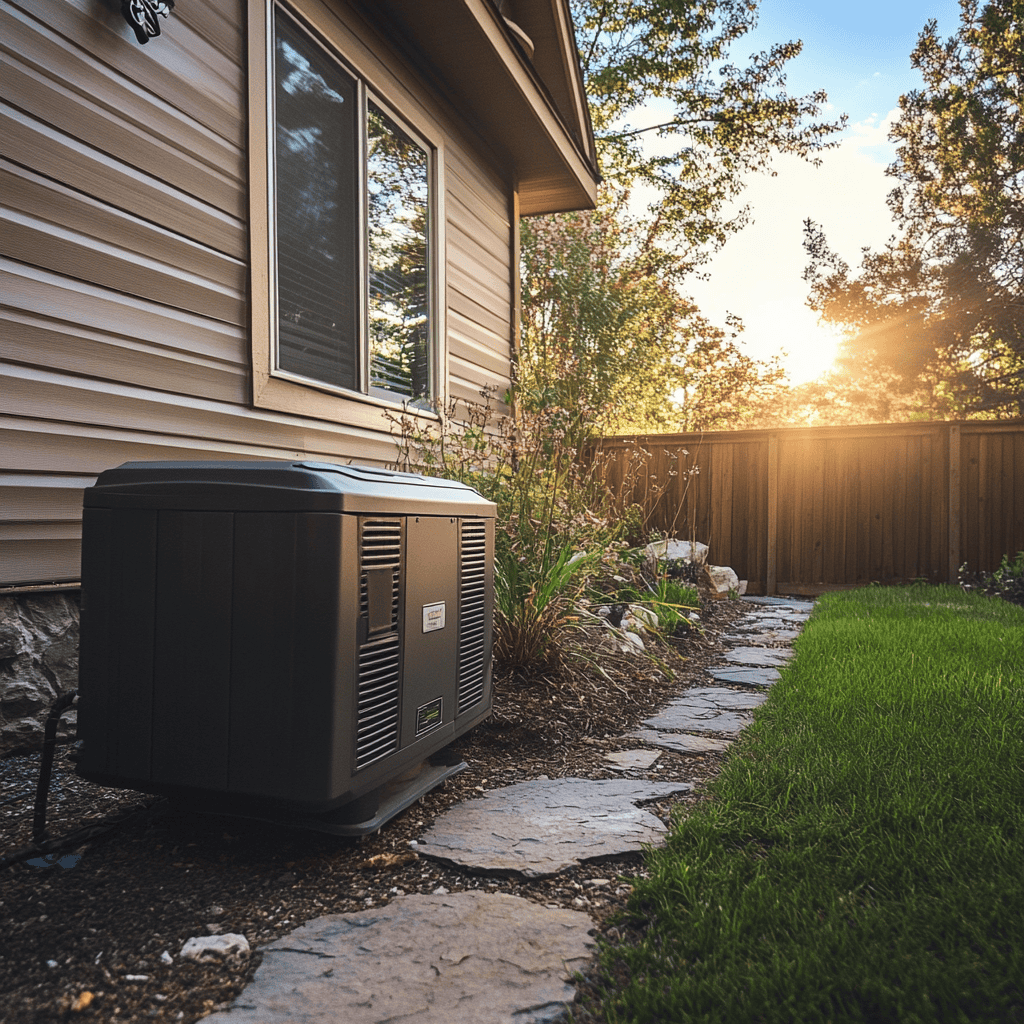Table of Contents
8 Best Home Generators for 2025
Choosing the best home generator for your needs can be overwhelming with so many options on the market. Whether you need a portable generator for emergency power or a whole-home generator for seamless operation during outages, this list covers the top 10 generators for 2025.

Portable Generators
Portable generators are ideal for smaller homes, outdoor activities, or powering essential devices during outages. Here are the top five options:
1. Honda EU2200i
- Type: Inverter Generator
- Power Output: 2,200 watts (starting), 1,800 watts (running)
- Fuel Type: Gasoline
- Why It’s Great: Ultra-quiet operation (48–57 dB), lightweight design at 47 pounds, and highly fuel-efficient. It offers stable power for sensitive electronics like laptops and smartphones.
- Best For: Small homes, apartments, camping, and light-duty emergency power.
2. Westinghouse iGen4500
- Type: Inverter Generator
- Power Output: 4,500 watts (starting), 3,700 watts (running)
- Fuel Type: Gasoline
- Why It’s Great: Features a remote start, digital display, and up to 18 hours of runtime on a 3.4-gallon tank. Quiet operation at 52 dB makes it ideal for neighborhoods.
- Best For: Medium-sized homes and powering sensitive electronics.
3. Champion 100573
- Type: Dual-Fuel Generator
- Power Output: 3,800 watts (running), 4,750 watts (starting)
- Fuel Type: Gasoline/Propane
- Why It’s Great: Dual-fuel capability provides flexibility during emergencies. Runs up to 9 hours on gasoline and 10.5 hours on propane. Compact design with a noise level of 68 dB.
- Best For: Homes needing versatile and reliable backup power.
4. Generac GP8000E
- Type: Portable Generator
- Power Output: 8,000 watts (running), 10,000 watts (starting)
- Fuel Type: Gasoline
- Why It’s Great: High power output for multiple appliances. Electric start for convenience and a durable design for long-term use.
- Best For: Medium homes requiring significant backup power.
5. DuroMax XP12000EH
- Type: Dual-Fuel Portable Generator
- Power Output: 12,000 watts (starting), 9,500 watts (running)
- Fuel Type: Gasoline/Propane
- Why It’s Great: Known as “The Beast,” it can power a small home during an outage. It features dual-fuel capability and a heavy-duty steel frame for durability.
- Best For: Homes needing substantial portable power and fuel flexibility.
[amazon table=”4482″]
Whole-Home Generators
Whole-home generators are permanently installed and provide automatic, reliable power for your entire house during outages. Here are the top five options:
6. Generac Guardian Series 22kW
- Type: Standby Generator
- Power Output: 22,000 watts
- Fuel Type: Natural Gas/Propane
- Why It’s Great: Wi-Fi-enabled for remote monitoring, automatic transfer switch, and ability to power large homes. Reliable and efficient with quiet operation.
- Best For: Large homes with heavy power demands.
7. Kohler 20RESCL-200SELS
- Type: Standby Generator
- Power Output: 20,000 watts
- Fuel Type: Natural Gas/Propane
- Why It’s Great: Durable design with corrosion-resistant housing, quiet operation, and a five-year warranty. Ideal for whole-house power backup.
- Best For: Homeowners seeking long-lasting reliability.
8. Champion 20kW aXis Standby Generator
- Type: Standby Generator
- Power Output: 22,000 watts
- Fuel Type: Natural Gas/Propane
- Why It’s Great: Provides fairly reliable whole-house power. Features an advanced low-tone muffler for quiet operation and an automatic transfer switch for seamless power.
- Best For: Medium homes needing efficient whole-house coverage.
[amazon table=”4486″]
How to Choose the Best Home Generator for Your Needs
Selecting the right home generator is essential to ensure your power needs are met during outages, emergencies, or outdoor activities. Here’s an expanded guide to help you decide between portable and whole-home generators and make the best choice based on your circumstances.
Portable Generators
Portable generators are a versatile and cost-effective option for homeowners who need temporary power for specific appliances or devices.
Short-Term Use
Portable generators are ideal for short-term use, such as during brief power outages, camping trips, or powering essential appliances like refrigerators, lights, or medical devices. They’re particularly useful in situations where mobility and flexibility are needed.
Key Factors to Consider
- Wattage Requirements: Calculate the total power needs of the devices you plan to run. For example, a refrigerator may need 600-800 watts, while a laptop or phone charger requires far less. Choose a generator with sufficient starting and running wattage to handle these devices.
- Fuel Type: Portable generators typically use gasoline, propane, or dual-fuel options.
- Gasoline is readily available but has a shorter shelf life.
- Propane burns cleaner and stores longer but may require a separate tank.
- Dual-Fuel Models offer the flexibility to switch between fuel types.
- Portability Features: Look for models with handles, wheels, and a lightweight design for easy transportation and storage.
- Noise Level: Consider quiet models, especially if you live in a densely populated area or plan to use the generator for camping.
Best For
- Small to medium-sized power needs.
- Homeowners who don’t require whole-house coverage.
- Those seeking a budget-friendly and flexible power solution.
Whole-Home Generators
Whole-home generators, also known as standby generators, are permanently installed and provide seamless, automatic power during outages.
Long-Term Reliability
Standby generators are the best choice for homeowners seeking reliable, long-term power for their entire house. They automatically detect outages, start within seconds, and supply power to critical systems like HVAC units, refrigerators, and lighting.
Key Factors to Consider
- Power Capacity: Whole-home generators come in various capacities, typically ranging from 10,000 to 22,000 watts or more. Ensure the generator can handle your entire home’s electrical load.
- Fuel Connection: Standby generators usually run on natural gas or propane:
- Natural Gas: Provides a continuous fuel supply if connected to your home’s utility line.
- Propane: Offers cleaner emissions and is a good alternative if natural gas is unavailable.
- Advanced Features: Look for additional functionalities, such as:
- Wi-Fi Monitoring: Allows you to track generator performance and maintenance needs remotely.
- Automatic Transfer Switch (ATS): Seamlessly switches between grid and generator power without user intervention.
- Installation Requirements: Professional installation is required for standby generators. Consider placement, permits, and ventilation requirements to ensure safe and efficient operation.
Best For
- Homes in areas prone to frequent or prolonged outages.
- Families with high power needs or critical systems, such as medical equipment.
- Homeowners looking for a hands-off, fully automated power solution.
General Considerations When Choosing a Generator
- Home Power Needs
- Assess the appliances and systems you want to power.
- Use a wattage calculator or consult a professional to determine your total energy needs.
- Fuel Availability
- Ensure the fuel type is readily accessible in your area.
- Consider dual-fuel models for greater flexibility during emergencies.
- Budget
- Portable generators are more affordable, typically ranging from $500 to $2,000.
- Whole-home generators are more expensive but provide superior reliability, with costs ranging from $3,000 to $10,000 or more, including installation.
- Noise Level
- Look for quiet models if noise is a concern. Inverter generators and some standby generators are designed for quieter operation.
- Warranty and Support
- Choose a generator with a robust warranty and easy access to service centers or customer support.
Conclusion
Selecting the best home generator comes down to understanding your needs and preferences. Portable generators are perfect for short-term, flexible use, while whole-home generators provide unparalleled convenience and reliability for powering your entire house. By carefully considering factors like power capacity, fuel type, and budget, you can invest in a generator that delivers consistent, worry-free power during any outage.
Additional Reading
Check out more of our blog posts and the Money Viper podcast.

